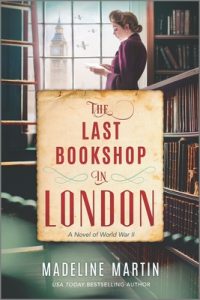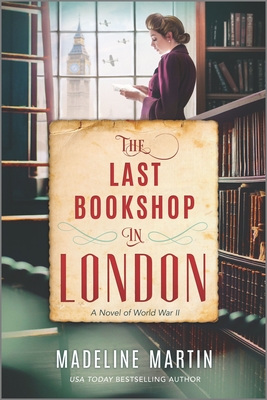 The Booklover's Library by Madeline Martin
The Booklover's Library by Madeline Martin Format: eARC
Source: supplied by publisher via Edelweiss
Formats available: hardcover, large print, paperback, ebook, audiobook
Genres: historical fiction, World War II
Pages: 416
Published by Hanover Square Press on September 3, 2024
Purchasing Info: Author's Website, Publisher's Website, Amazon, Barnes & Noble, Kobo, Bookshop.org, Better World Books
Goodreads
A heartwarming story about a mother and daughter in wartime England and the power of the books that bring them together.
In Nottingham, England, widow Emma Taylor finds herself in desperate need of a job to provide for herself and her beloved daughter, Olivia. But with the legal restrictions prohibiting widows with children from most employment opportunities, she’s left with only one option: persuading the manageress at Boots’ Booklover’s Library to take a chance on her.
When the threat of war becomes a reality, Olivia must be evacuated to the countryside. In her daughter’s absence, Emma seeks solace in the unlikely friendships she forms with her neighbors and coworkers, as well as the recommendations she provides to the library’s quirky regulars. But the job doesn’t come without its difficulties. Books are mysteriously misshelved and disappearing, and her work forces her to confront the memories of her late father and the bookstore they once owned together before a terrible accident.
As the Blitz intensifies in Nottingham and Emma fights to reunite with her daughter, she must learn to depend on her community and the power of literature more than ever to find hope in the darkest of times.
My Review:
When this story truly opens, after a heartbreaking prologue, it’s August of 1939 and the impending war is NOT the biggest problem looming on Emma Taylor’s horizon.
Her immediate worry is continuing to put food on the table – as well as continuing to have a table to put it on – for herself and her eight-year-old daughter Olivia. As a widow with a child, Emma is unemployable – regardless of her skills, her abilities, or her outright need to support herself and that child.
And her widow’s pension plus the government stipend for her daughter aren’t nearly enough to make ends meet – no matter how much Emma scrimps and saves – which she absolutely does – at every single turn.
Emma’s parents are dead, her late husband’s parents are, frankly, terrible – or at least they were the last time she saw them – and she has no options and no prospects. Not because she’s not capable but because that’s the way society wills it. (I am holding myself back from getting up on a soapbox SO HARD!)
The war is about to change all of that, but Emma doesn’t know it, yet.
Still, on a cold and rainy afternoon, a door opens for her in the person of Miss Bainbridge, the manager of Nottingham’s Boots’ Booklover’s Library. The Boots’ libraries, which really did exist, were subscription lending libraries housed within Boots’ Chemist shops around the country. They had strict educational requirements and equally strict standards for their female ‘librarians’.
Emma had the skills, after growing up in her late father’s bookshop, and Miss Bainbridge, for reasons of her own, bent the rules. Rules that began going by the wayside not long after, as Britain declared war on Germany after its invasion of Poland.
In the midst of what later became known as the “Phoney War”, the parents in cities that were determined to be targets for German bombers shipped their children out to the hopefully safer countryside. Nottingham was chock full of factories that either had been or would be converted to war production.
Olivia, like so many children, was sent – or evacuated as it was referred to – turning the white lie of Emma being alone into a lonely truth. A truth that, even as it broke her heart a bit, forced her into relying on her fellow librarians for companionship and friendship and opened up her world and her place in it, if only to get herself away from a flat that was empty, quiet and much, much too clean.
The Booklover’s Library becomes a story on three levels. On the first level, there’s Emma, her work and her life on the homefront as the Blitz bombards Nottingham as well as other industrial centers. On the second, there’s Olivia’s own story, an independent adventure she feels forced to take as hers becomes one of the placements that does not work out – at all. And over all of that, there’s the story of the power of literature to build community – and to help people find a light in even the darkest of places.
And if that last piece of the story reminds readers of The Last Bookshop in London, it’s only right that it should. Both The Booklover’s Library and The Last Bookshop in London are from the same talented pen, and both tell charming and heartwarming stories centered on the early days of that terrible war.
 Escape Rating B: I picked up The Booklover’s Library because I was fascinated by the concept AND because I enjoyed the author’s earlier book, The Last Bookshop in London. (Which is absolutely a readalike for this book and vice versa!)
Escape Rating B: I picked up The Booklover’s Library because I was fascinated by the concept AND because I enjoyed the author’s earlier book, The Last Bookshop in London. (Which is absolutely a readalike for this book and vice versa!)
That both stories are grounded in surprising bits of real history made them that much more captivating. In this story, it’s the existence of the Boots’ Booklover’s Libraries, which existed until 1966! What’s notable about the Boots’ libraries is that they provided popular fiction – even salacious fiction – to their middle-class subscribers.
(The debate about popular vs. improving literature in public libraries has been loud, vociferous, and contentious in both the UK and the US and is STILL ongoing.)
As a librarian, I found the portrait of the Boots’ library, how it worked and how its ‘librarians’ were trained to be utterly fascinating, while the friendship, camaraderie and support that developed among the women working there – particularly under wartime conditions – is sure to charm the heart of ANY reader.
The story of the evacuations, told from both the perspective of Emma who misses her daughter but wants her safe, and Olivia who has found that safety from bombing is not nearly enough, provides a perspective that adds to the depth of the story. (This was not my favorite part of the story, but it was an important part nonetheless.)
Like The Last Bookshop in London, the story of The Booklover’s Library does not go into the details of Emma’s and Olivia’s experiences through the whole war. It doesn’t need to. It ends at the point where their personal crises have been resolved even though the war has several years to run. The icing on this cake – even if sugar is rationed – is that Emma has her chance at a Happy Ever After. The rest of their war will be following that admonition to ‘Keep Calm and Carry On’, but in much happier circumstances in spite of the war. And together.
But the reader needs to know that Emma, Olivia and their friends and loved ones made it out okay. Which we do get in a sparkling epilogue. A fitting ending to a lovely read.


 The Last Bookshop in London: A Novel of World War II by
The Last Bookshop in London: A Novel of World War II by 
